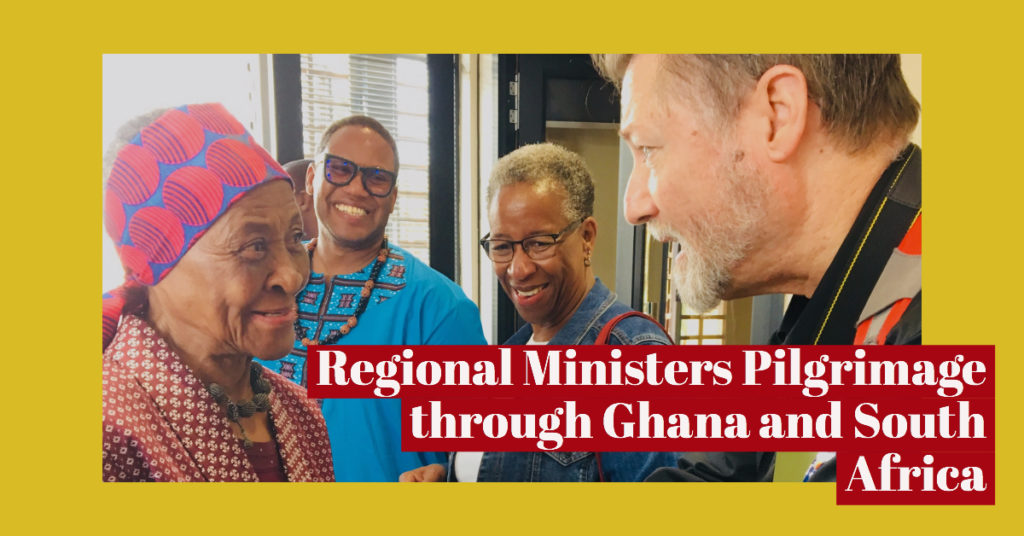A Pilgrimage through Ghana and South Africa: Reflections of Disciples Regional Ministers
Pilgrimage participants:
Dale Braxton – Alabama-Northwest Florida Region
Nadine Burton – Great River Region
LaTaunya Bynum – Northern California-Nevada Region
Penny Ross Corona – Mid-America Region
Jennifer Garbin – Canada Region
Bill Rose-Heim – Greater Kansas City Region
Marco Cable – Global Ministries Area Executive for Africa
Lorna Hernandez – Global Ministries People to People Program Coordinator
All of Life is to be Bathed in Prayer
August 15, 2018
Penny Ross-Corona
As we settled into the van to begin the three and a half hour drive to Ho, it was our driver, Ben, who requested that we begin this leg of our journey with prayer. As chaplain for the day, the person responsible for leading the group in prayer and reflection, I was grateful for Ben’s reminder and how he immediately engaged the group in morning prayers. I cannot remember who said, “All of life is to be bathed in prayer,” but that was the phrase that was in my head for the remainder of the day.
It was good to be welcomed to Ho by Rev. Seth Adigi, Moderator of the Evangelical Presbyterian (EP) Church, Ghana (a Global Ministries partner), and his staff. We learned about some of the joys and challenges of their ministry with 600 plus congregations. I had briefly met Rev. Adigi in June when we both attended the Presbyterian Church USA General Assembly in St. Louis. It turns out that Rev. Adigi went to seminary at Eden in St. Louis (which is where my office is located). What a small world! From my region, Larry and Debbie Colvin have been appointed as Global Ministries Mission Co-workers to serve with the EP Church, Ghana. Larry and Debbie begin their appointment in October. Unfortunately, due to time constraints, we were unable to travel to Peki, the community where the Colvins will be living and serving.
We checked into the EP Church, Ghana’s guesthouse, and after a delicious lunch, Youth Desk Program Officer, Rev. Erick Gle, rode with us to visit one of the local ministries of EP Church, Ghana, the Nenyo Haborbor Street Children’s Project. There, we met two amazing women, Mother Olivia and Sister Florence, who staff this important ministry. The Nenyo Haborbor Street Children’s Project is designed to keep street children in school and to provide them with job skills as they get older. Mindful that all of life is to be bathed in prayer, we laid hands on Mother Olivia, Sister Florence, and Rev. Eric, asking God’s continued blessings on their outstanding work. What a treat afterward to meet some of the children! Together we sang “Jesus Loves Me” and also had prayer. They responded by playing in a drum circle.
That evening, we attended a program for the Girls and Boys Brigade that was held at a local EP Church, Ghana church. Around 300 enthusiastic and friendly young people attended and presented wonderful skits, dances, and music. I was happy to see how talented, engaged, and attentive the young people were. It was evident that they loved being together and being at church.
Clearly, hospitality is in the DNA of the people of Ghana, starting with the children. It is a spiritual gift. Everyone we interacted with all day was so welcoming. Our new friends in Ghana have truly blessed us!
Blessed Awakening
August 16
Bill Rose-Heim
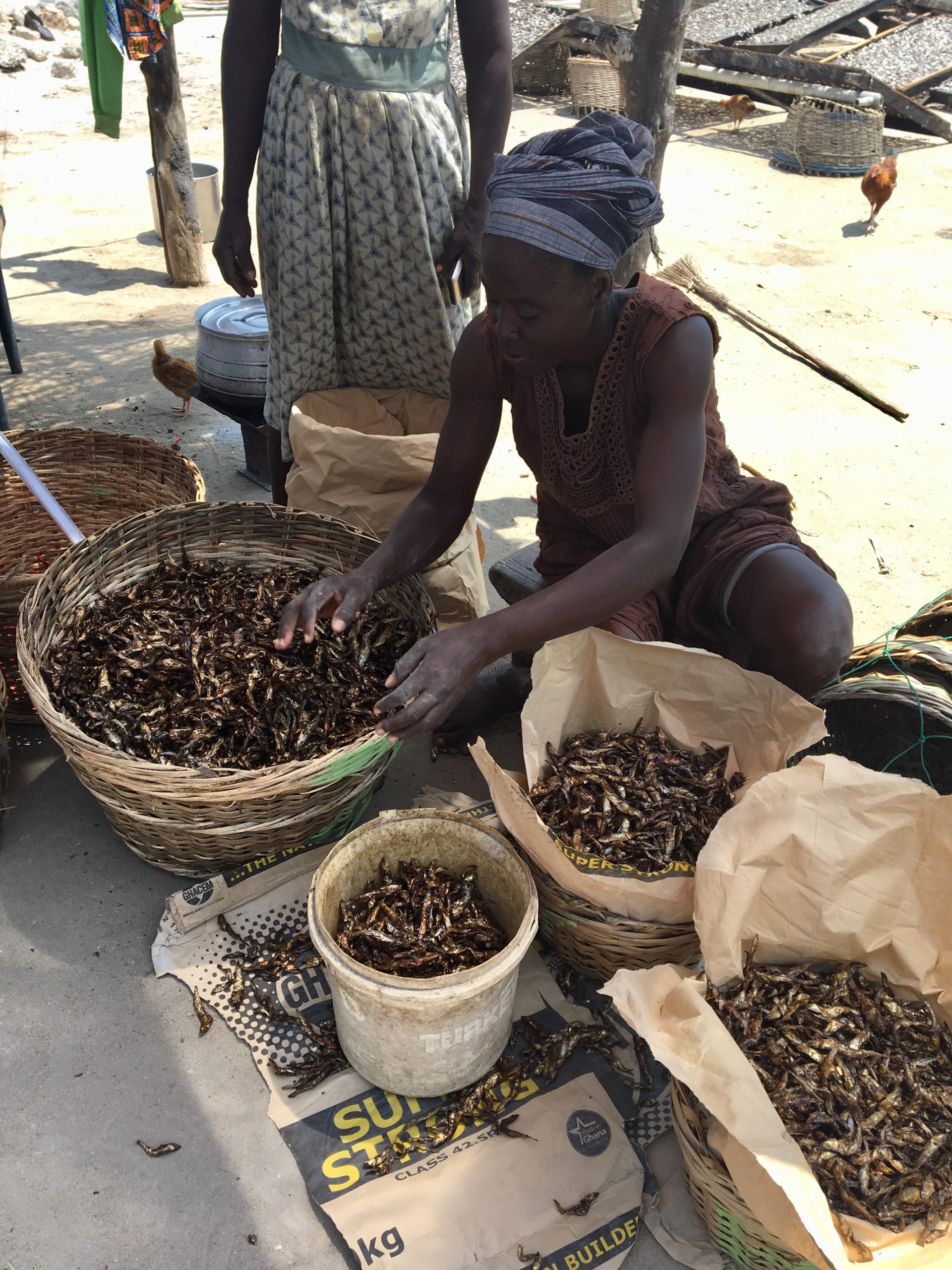 We awaken to the sound of a hundred or more voices, women and men, some adding harmonies to spirited praises of God in the sanctuary next door to the guest house. It is 5:00 in the morning! The sun will not be up for another hour but for these who will work early and late for daily bread, the Son is already shining. Interrupted sleep? No. Blessed awakening. The way every day might begin with gratitude being genuinely, artfully, and joyfully expressed.
We awaken to the sound of a hundred or more voices, women and men, some adding harmonies to spirited praises of God in the sanctuary next door to the guest house. It is 5:00 in the morning! The sun will not be up for another hour but for these who will work early and late for daily bread, the Son is already shining. Interrupted sleep? No. Blessed awakening. The way every day might begin with gratitude being genuinely, artfully, and joyfully expressed.
Before boarding the van to the communities by the seashore, Ruth stops by. She is in Ghana on behalf of the Presbyterian Church USA, and assists church health clinics to become certified so that insurance companies will help with people’s health care expenses. While we travel, we notice people moving at various speeds – some on their way, some spreading peppers to dry in the sun, some women walking, arms at their sides, carrying large plates of peanuts or tubs of cold drinks balanced perfectly on their heads. Many children, on summer vacation from school, are working. Young men run alongside moving minibuses. One hands a loaf of fresh bread into an open window to a would-be customer. I think of Jesus running unseen alongside our van, determined that I, too, would take in today the Bread of Life he offers freely through any open window. God, keep my spirit hungry today for the fruits of your Holy Spirit!
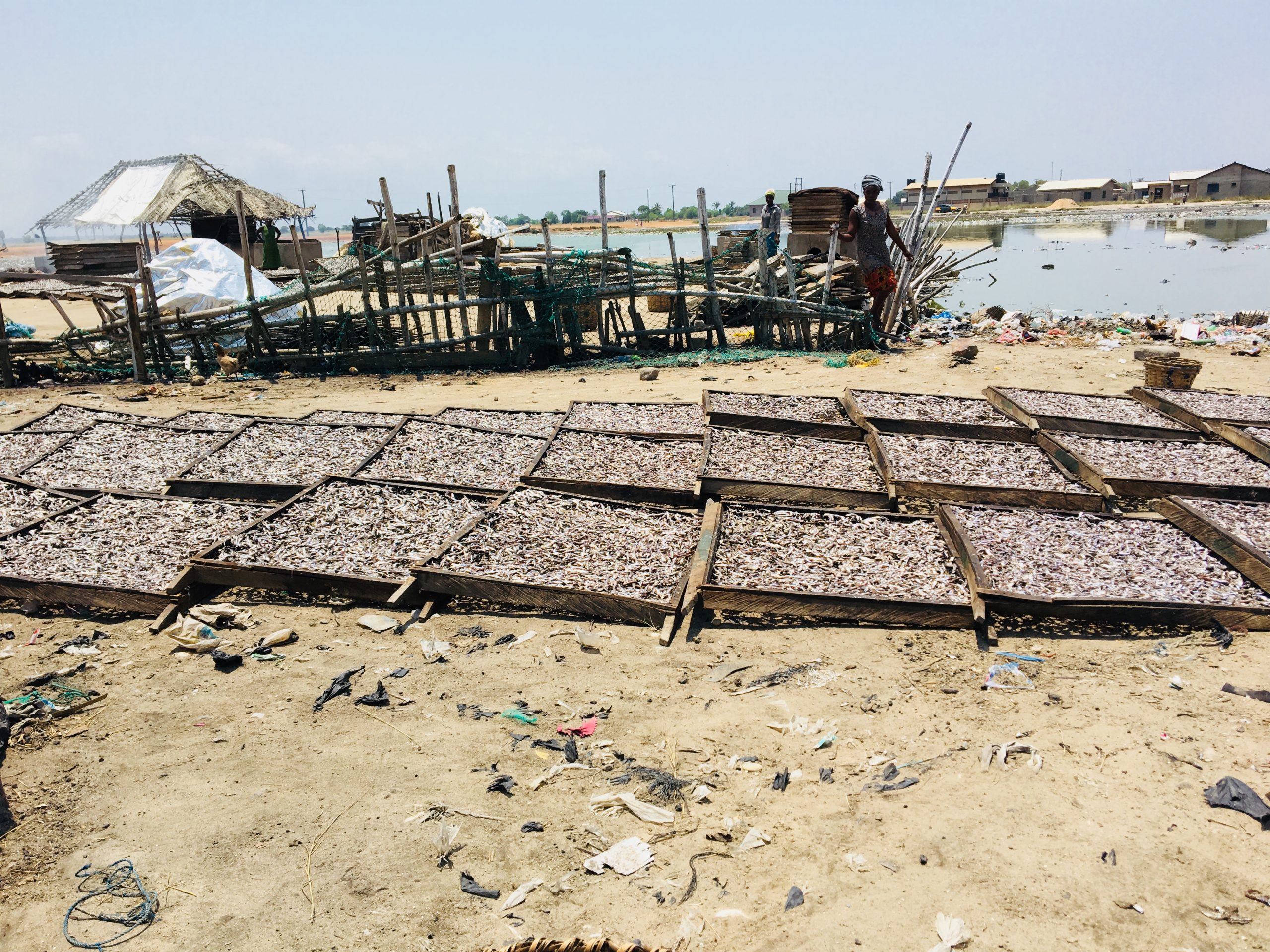 This afternoon we visited two communities, Ada West and Ningo, where women are being helped to smoke and preserve fish to sell in lean times at markets in Ghana and neighboring countries. Fishing is not always a lucrative business. The profit margins are slim and in seasons when there are fewer fish to catch, hunger drives some parents to let others take in some of the children. Sadly, not all adults keep their promises. Some of those entrusted children are trafficked. Global Ministries and other internal partners provide funds to buy materials and provide training in how to smoke, preserve, and store fish to sell out of season. Joyce Larko Steiner, Director of Programs and Advocacy for the Christian Council of Ghana, serves as a consulting partner, offering advice and accountability for these new entrepreneurs. The profits made are enough to feed and care for the children who can grow up free to be whatever they will be. Rev. Dr. Rita Nakashima Brock, in her book, Saving Paradise, reminded me that the first common symbol for the young Church was not the cross but the fish. Often traced on the ground, it served as a sign of a welcome by the community following in the Way of Jesus. This partnership around children, mothers and fathers, and fish is as beautiful an act of worship as any of the hymns we heard this morning.
This afternoon we visited two communities, Ada West and Ningo, where women are being helped to smoke and preserve fish to sell in lean times at markets in Ghana and neighboring countries. Fishing is not always a lucrative business. The profit margins are slim and in seasons when there are fewer fish to catch, hunger drives some parents to let others take in some of the children. Sadly, not all adults keep their promises. Some of those entrusted children are trafficked. Global Ministries and other internal partners provide funds to buy materials and provide training in how to smoke, preserve, and store fish to sell out of season. Joyce Larko Steiner, Director of Programs and Advocacy for the Christian Council of Ghana, serves as a consulting partner, offering advice and accountability for these new entrepreneurs. The profits made are enough to feed and care for the children who can grow up free to be whatever they will be. Rev. Dr. Rita Nakashima Brock, in her book, Saving Paradise, reminded me that the first common symbol for the young Church was not the cross but the fish. Often traced on the ground, it served as a sign of a welcome by the community following in the Way of Jesus. This partnership around children, mothers and fathers, and fish is as beautiful an act of worship as any of the hymns we heard this morning.
On our way back to the hotel in Accra we pass through villages and towns where the pace of life is slower and relationships remain a high priority. As we get closer to the city we cannot help but notice a faster pace, with more new buildings and thriving businesses. Ghanaians we have met are proud of their freedom, passionate about education, and determined to continue building a better life, but on African rather than Western terms. The same can be said of Christians here. Christians are seventy percent of the population here and they have much to offer the one, holy, universal and apostolic Church. We who are members of the Christian Church (Disciples of Christ) and the United Church of Christ have been invited – through our Global Ministries partners – to help realize God’s preferred future for the Church.
Give Big Ear
August 17, 2018
Jennifer Garbin
The day in Accra was a busy one. We began the morning with a tour of the Christiansburg Slave Castle, the first of its kind on the coast of Ghana (built in the 1450s). Immediately afterward, we attended the opening ceremonies of a new festival which focuses on celebrating the resilience of the African people. The Pil-lo (Hide and Seek) Festival welcomes back descendants of African captives who were sold into the Trans-Atlantic slave trade, and invites everyone to reflect on the sacredness of life for all and the importance of finding our roots. After the ceremony, which included dance, music, and various speeches by dignitaries of all kinds, we were whisked off to Trinity Theological School to take part in the commencement of their Pastoral Care and Counseling program, a program that equips men and women, lay and clergy, with skills necessary to provide vital pastoral care in communities across the country.
The commencement address was inspiring, and the words “give big ear” stood out in my mind as particularly important. So often, when encountering stories that are difficult to hear – stories of suffering, oppression, and injustice – we in the Western world are quick to dismiss them, quick to change the subject, or sugar coat the subject. Rather, we are called to be deep and active listeners… to notice and pay attention to the stories of everyone, not just the nice, tidy ones that make us feel good about ourselves. We need to give big ear to the suffering of the world, allow it to flow deep within us, touching us not only intellectually, but emotionally and physically as well. We pay lip service too often to listening to and caring about the stories of suffering, and we need to do better.
For when we allow the deep need and suffering of the world to touch us in profound ways, we should be stirred to action. I hope that we begin to open our eyes to our own privilege, as well as to our own calling to stand in the gap between injustice and justice, to bring about healing and restoration. It is not easy. Nor should it be. However, it is our calling as children of God to be stirred by what we hear and see, and to act with God’s reconciling and healing love.
Door of No Return
August 18, 2018
Dale Braxton
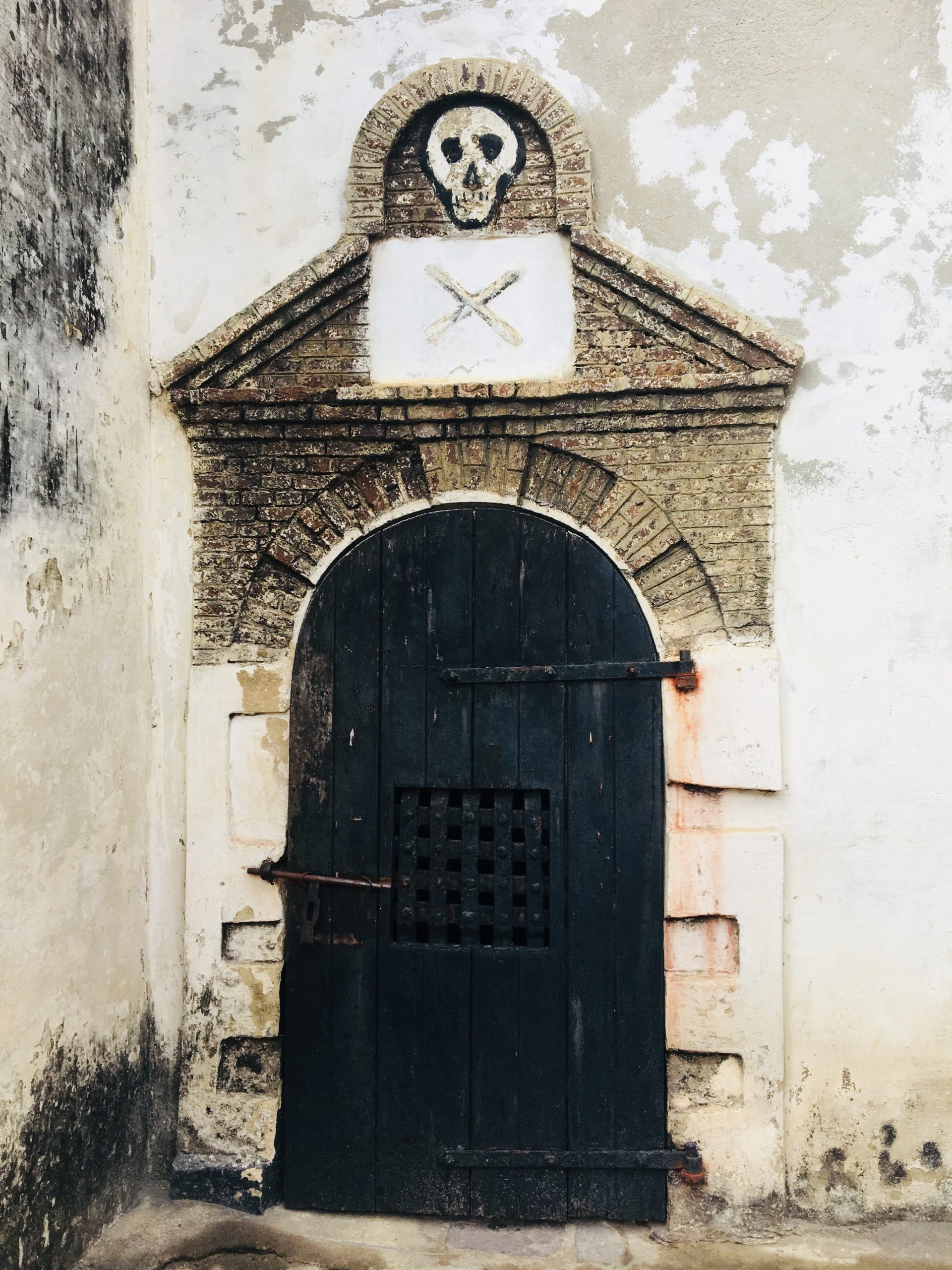 Today, we are up at 3:00 a.m. ready to visit the Elmina Slave Castle, where Africans were caged before being sold into the Trans-Atlantic slave trade. Elmina Slave Castle is about four hours from Accra. As we travel to Elmina following behind a van with the writing in the window “Let my people go,” we continued our journey to the castle. The tour guide gave an excellent presentation about the Trans-Atlantic Slave Trade. He shared learnings about the abuses and rape of women by the Dutch Governor in charge. He shared how Africans were treated as less than cargo, and we looked down the path of the “door to no return,” and through the narrow door where people had been stripped of their humanity. As we saw and heard the stories about the slave trade, we found the chapel where the Portuguese and the Dutch praised God while thousands were being tortured.
Today, we are up at 3:00 a.m. ready to visit the Elmina Slave Castle, where Africans were caged before being sold into the Trans-Atlantic slave trade. Elmina Slave Castle is about four hours from Accra. As we travel to Elmina following behind a van with the writing in the window “Let my people go,” we continued our journey to the castle. The tour guide gave an excellent presentation about the Trans-Atlantic Slave Trade. He shared learnings about the abuses and rape of women by the Dutch Governor in charge. He shared how Africans were treated as less than cargo, and we looked down the path of the “door to no return,” and through the narrow door where people had been stripped of their humanity. As we saw and heard the stories about the slave trade, we found the chapel where the Portuguese and the Dutch praised God while thousands were being tortured.
When the Portuguese discovered gold at Anomanso they named it “Mina Douro,” which means “River of Gold” or the “mine” in the Portuguese language, hence the name of Elmina. The guide shared that the name original name of the community was “Edina” which is an equivalent of Portuguese word “Aldea” meaning “village,” and that the original name of Elmina was “Anomansa” meaning “water never finished.”
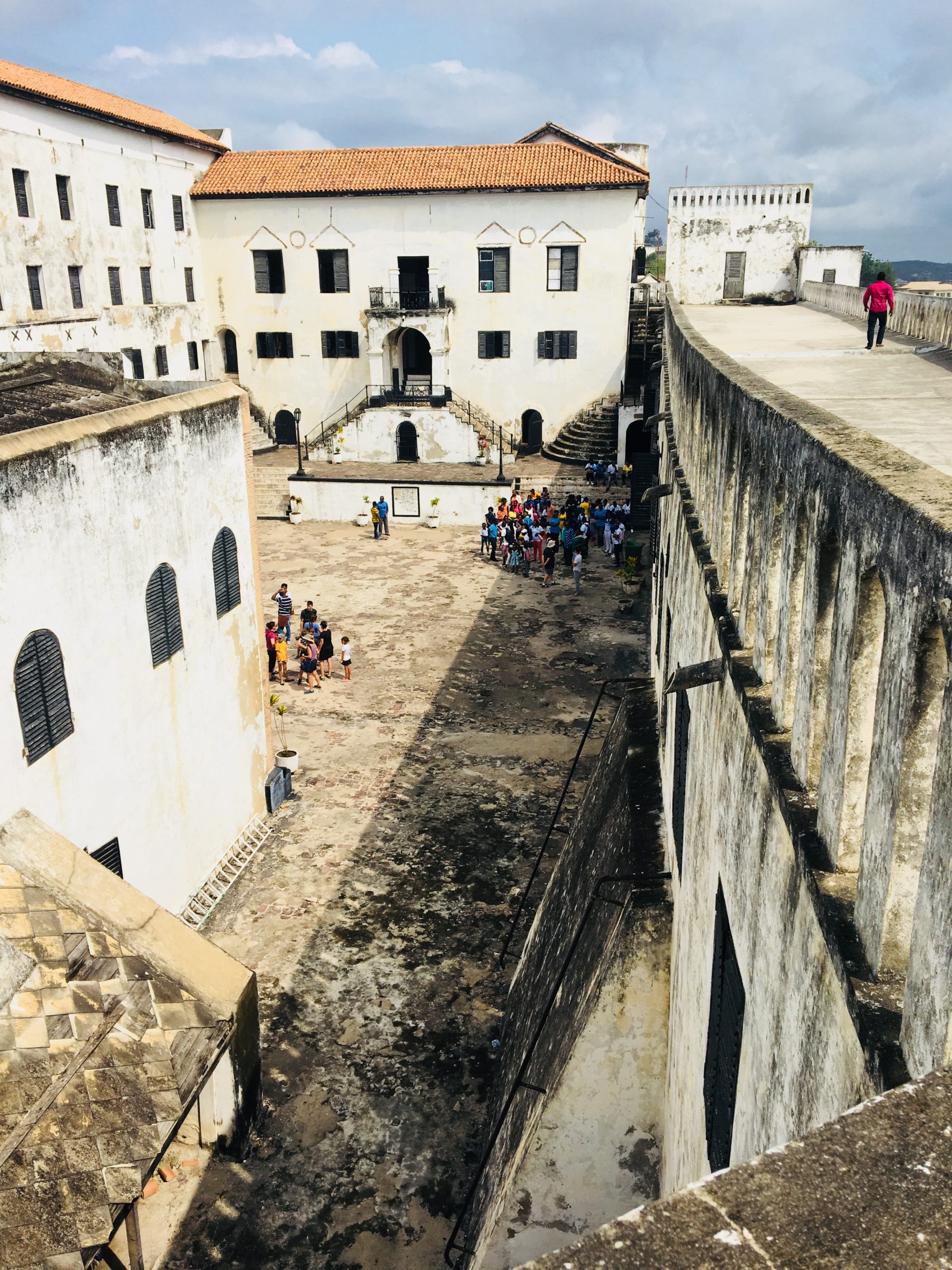 The original use of the castle was to trade goods, however, the Portuguese converted the trade into the exchange of people . This became the primary use of the Castle for about 155 years, and the Dutch finally captured and took over in 1637. The four main sources of acquiring slaves were:
The original use of the castle was to trade goods, however, the Portuguese converted the trade into the exchange of people . This became the primary use of the Castle for about 155 years, and the Dutch finally captured and took over in 1637. The four main sources of acquiring slaves were:
- Forced Capture: Initially the Europeans were capturing the Africans by force and gunpoint. This method of captivity was very risky to their lives because some Africans resisted and fought back in the process.
- Kidnapping and Raiding: Africans collaborated with Europeans laying ambush close to farms, and rivers sides, kidnapping people on their way to fetch water and to harvest farm produce. Some slaves’ raiders burned houses and captured the victims who ran for their lives. They were kidnapped at gunpoint.
- Theft and Deceit: The Europeans were promising the Africans better living conditions abroad, but in the end, they were used as slaves. Some were invited to board the ships while drumming and dancing under the influence of alcohol and the ships sailed away.
- Bartering: Many times, Africans tribes were waging war against each other, fighting over lands and rivers to expand their territories. Any time there was a war between the two tribes; some of the defeated members were captured and sold into slavery.
When entering the castle, the tour guide pointed to the female courtyard and the Governor’s balcony. Over 400 female African captives were forced to survive in a small overcrowded space. The Governor would walk out and look over the women to see which one could satisfy his sexual desire and have them come to his room while passing through a side door after having a bath in a public water reservoir. It was stated that if by chance one of the women became pregnant and gave birth to a child, the child would be called mulatto and given a European name. The male courtyard and dungeon held over 600 African captives. The Portuguese were Roman Catholic and built their first chapel next to the male dungeons. The Dutch Reformed chapel was closed to the female dungeons. The captives were sent to the Americas and Europe.
In one hallway was this saying:
“In the everlasting memory of the anguish of our ancestors
May those who died rest in peace.
May those who return find their root.
May humanity never again perpetrate such injustice against humanity.
May, we the living vow to uphold this.
Shepherd for the Shepherds
August 19, 2018
Jennifer Garbin
Our day was filled with travel…lots and lots of travel. We landed in South Africa and were exhausted after a very long day. Throughout the day, as I reflected on what we had encountered throughout the pilgrimage so far, and what was still to come, there were a number of texts that jumped to my consciousness. The one that finally seemed to sum up our journey so far was one so common that I struggled with the Spirit, thinking that it was too predictable, too well known. Yet, the 23rd Psalm seemed to sum up so beautifully all of the questions and hopes that I had on this trip so far.
Take a moment to read the 23rd Psalm a couple of times, if you can. Let the words wash over you…and sit with each of the phrases, allowing space for Spirit to coax out of you deep convictions, and immediate reflections. Regardless of the pilgrimage you are on, this Psalm is an excellent framework for looking beneath the surface and beyond the obvious!
Learning to Live with Others
August 20, 2018
Nadine Burton
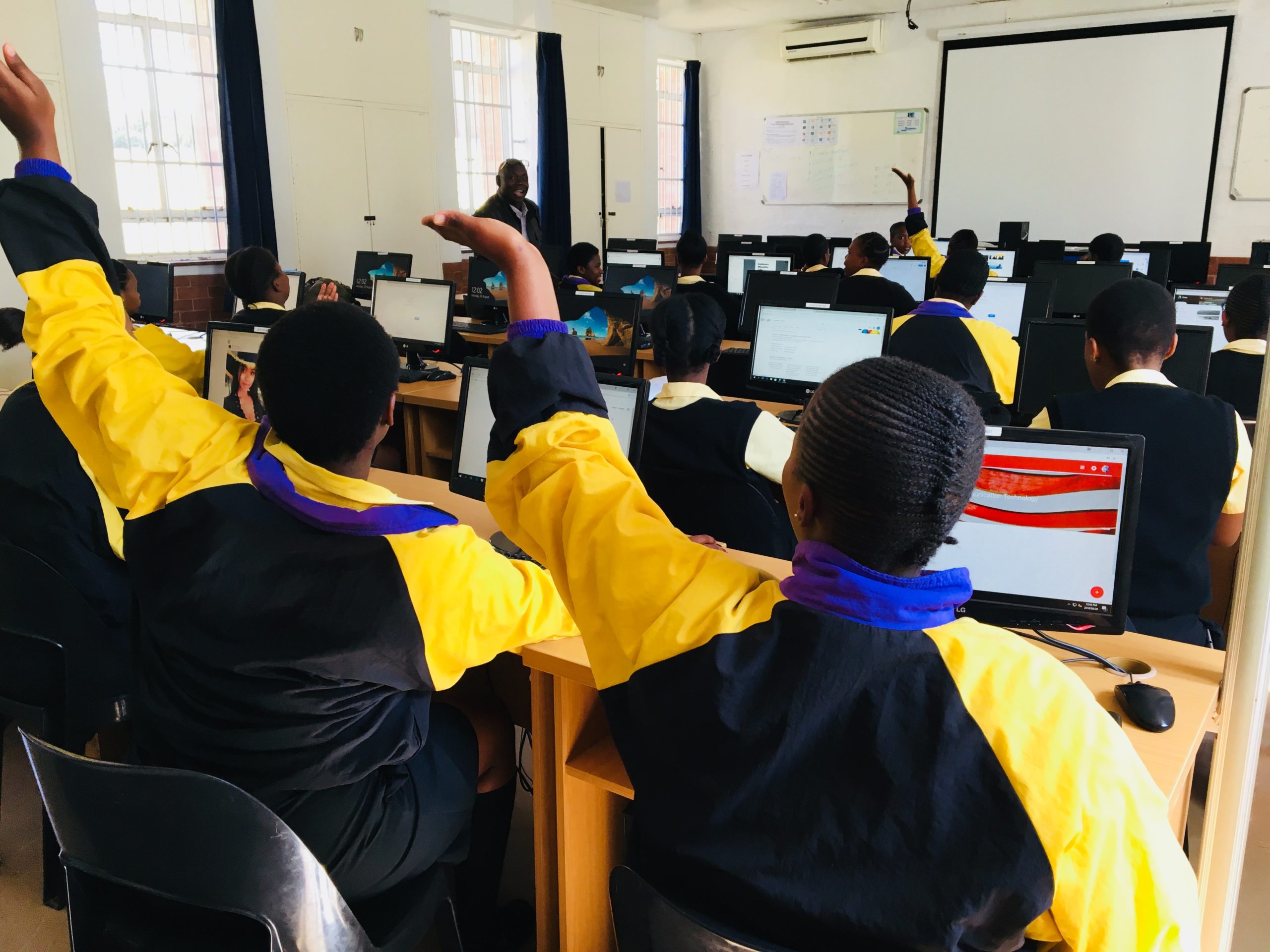 We visited Inanda Seminary, a girls’ boarding school and Global Ministries partner, located in KwaZulu-Natal, and toured the campus. Daniel and Lucy Lindley, US congregational missionaries, started the school in 1847. Inanda Seminary currently has an enrollment of 415. They have a maximum capacity of 450 students. The annual cost of registration to attend the school is $4500 per year in US dollars for one girl. Although some of the fees are subsidized through grants and scholarships, Ms. Kim Simon, the Principal, shared that some girls have been forced to leave the school because their parents are unable to pay the fees.
We visited Inanda Seminary, a girls’ boarding school and Global Ministries partner, located in KwaZulu-Natal, and toured the campus. Daniel and Lucy Lindley, US congregational missionaries, started the school in 1847. Inanda Seminary currently has an enrollment of 415. They have a maximum capacity of 450 students. The annual cost of registration to attend the school is $4500 per year in US dollars for one girl. Although some of the fees are subsidized through grants and scholarships, Ms. Kim Simon, the Principal, shared that some girls have been forced to leave the school because their parents are unable to pay the fees.
The group was divided into groups of two and assigned to two students who they accompanied to class and lunch. I attended an English Class. The students were assigned to write a paragraph on their chosen topic. The professor shared that their language skills are perfect, however, their writing skills needed work. One young lady chose to write on the topic, “why I hate my school.” I questioned why she chose the word “hate.” I felt it was such a strong word used to describe how she was feeling. She shared that it is difficult because, at home, it is her, her siblings and mom in one place. She said, “Here at the seminary, I have to learn to live with other people.” This caught my attention as I reflected on the heart of the gospel – learning to live with other people, sometimes in isolated spaces, or places where we are uncomfortable, yet called to serve. In that moment, I thought on the word “hate” as it is so commonly used to divide, oppress, and hurt select groups of people. I pray that one day we will learn to live with each other.
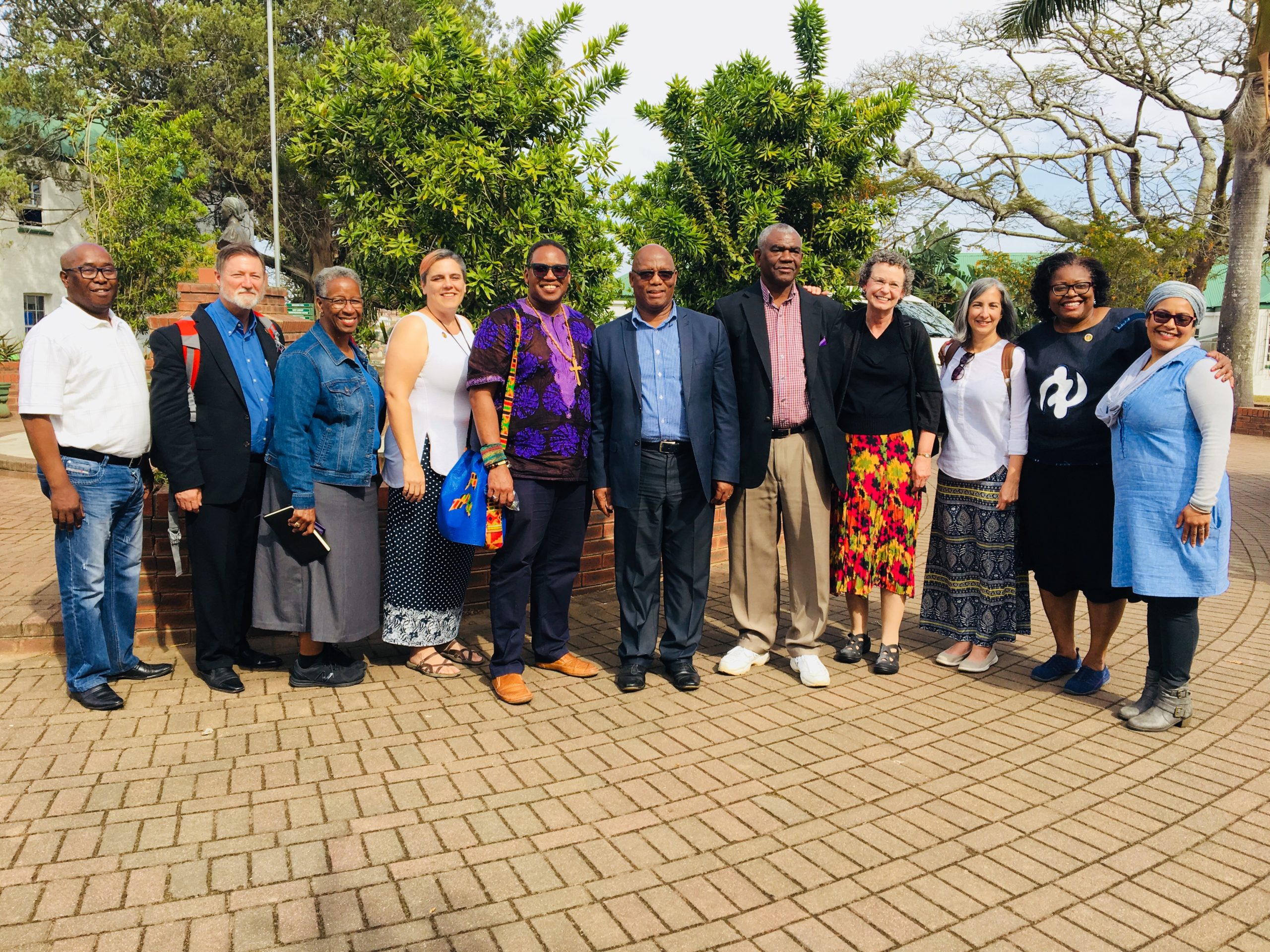 We also ate lunch together. I noticed when walking into the lunch room, the food was set up for our group on a platform overlooking the first floor of the lunchroom. Lorna and I asked if we could eat lunch with the girls. We wanted to use every opportunity to spend time with them. During lunch, we got into some lively conversations about life, spirituality, dating, and sexuality. The conversation turned serious very quick. These conversations led us to consider and understand our relationship with God. We shared and laughed at what they thought were embarrassing questions. I shared that their lives are important enough to ask the embarrassing questions. The time at Inanda taught me that young girls, no matter where they are, should have the opportunity to learn, soar, and develop into empowered women who can change the world.
We also ate lunch together. I noticed when walking into the lunch room, the food was set up for our group on a platform overlooking the first floor of the lunchroom. Lorna and I asked if we could eat lunch with the girls. We wanted to use every opportunity to spend time with them. During lunch, we got into some lively conversations about life, spirituality, dating, and sexuality. The conversation turned serious very quick. These conversations led us to consider and understand our relationship with God. We shared and laughed at what they thought were embarrassing questions. I shared that their lives are important enough to ask the embarrassing questions. The time at Inanda taught me that young girls, no matter where they are, should have the opportunity to learn, soar, and develop into empowered women who can change the world.
Speak Up!
August 21, 2018
Penny Ross-Corona
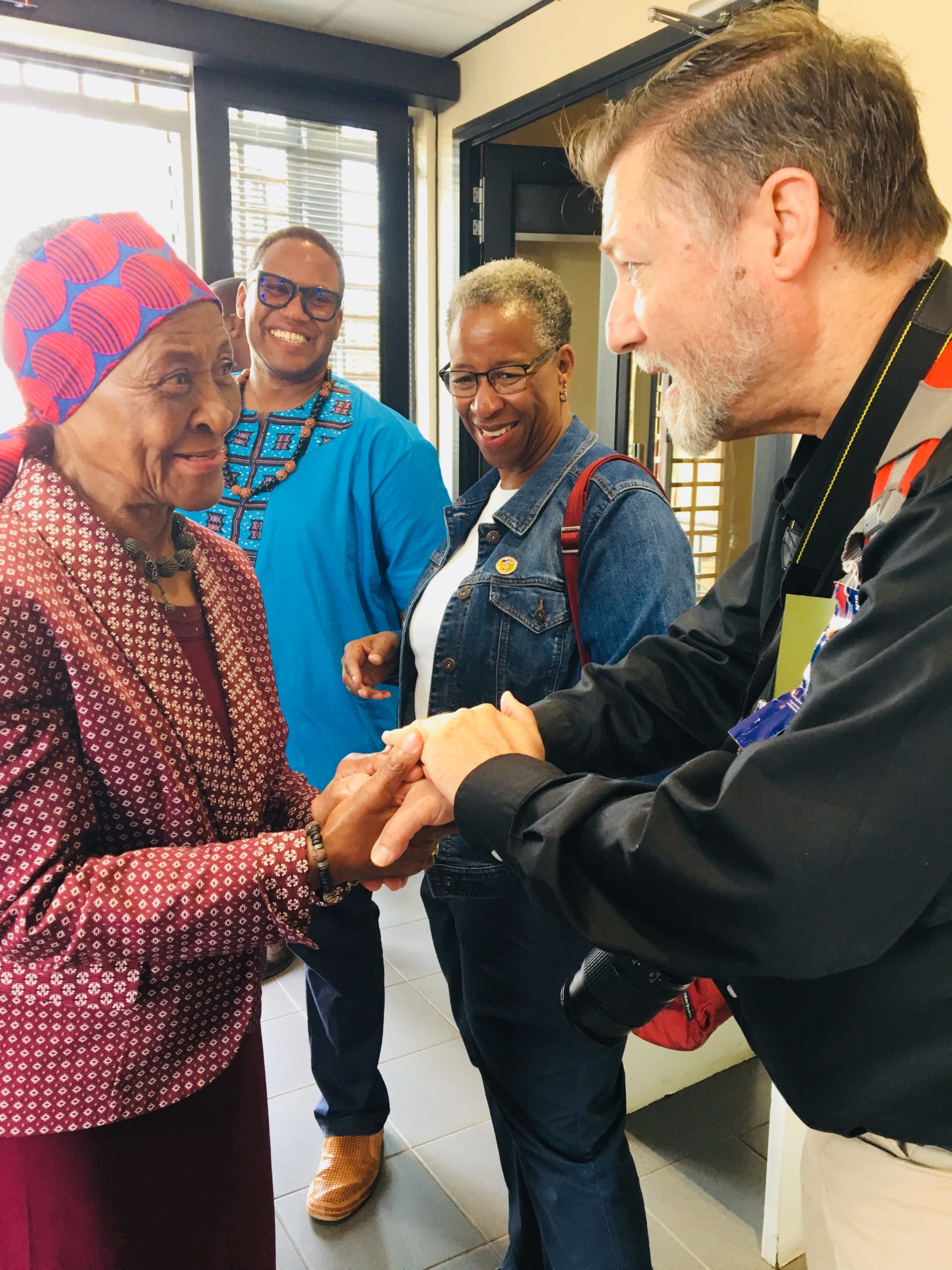 Visiting the Chief Albert Luthuli Heritage Site and Museum at Groutville felt like we were walking on holy ground. Chief Luthuli was a minister in the United Congregational Church of South Africa (UCCSA), a Global Ministries partner. He was also president of the African National Congress (ANC) and was awarded the Nobel Peace Prize in 1960. In 1967, he was assassinated for his leadership against Apartheid. His oldest daughter, Dr. Albertina Luthuli, who happened to be at the museum judging a primary school speech contest that day, welcomed us. After our tour of the museum (which is formerly the Luthuli home), one of the museum guides brought our group into the room where primary school children were gathered, so we could meet this exceptionally bright group and hear one of the speeches. One of the school’s teachers chose an eleven-year-old boy, who repeated for us his outstanding speech on a “Rainbow Nation,” and we enthusiastically cheered. As we were leaving, we noticed one of the girls in tears. We later found out that she was the one who had actually won the speech contest. It turns out the boy was the second place winner. He was invited to share his speech with us, rather than the girl who had gotten first place. There was nothing fair about that. Indeed, it made us realize that there is still much to be done for the fostering of gender and racial equality in South Africa as well as the U.S. The ugliness of injustice took place right under our noses in a setting that was centered in the quest for justice.
Visiting the Chief Albert Luthuli Heritage Site and Museum at Groutville felt like we were walking on holy ground. Chief Luthuli was a minister in the United Congregational Church of South Africa (UCCSA), a Global Ministries partner. He was also president of the African National Congress (ANC) and was awarded the Nobel Peace Prize in 1960. In 1967, he was assassinated for his leadership against Apartheid. His oldest daughter, Dr. Albertina Luthuli, who happened to be at the museum judging a primary school speech contest that day, welcomed us. After our tour of the museum (which is formerly the Luthuli home), one of the museum guides brought our group into the room where primary school children were gathered, so we could meet this exceptionally bright group and hear one of the speeches. One of the school’s teachers chose an eleven-year-old boy, who repeated for us his outstanding speech on a “Rainbow Nation,” and we enthusiastically cheered. As we were leaving, we noticed one of the girls in tears. We later found out that she was the one who had actually won the speech contest. It turns out the boy was the second place winner. He was invited to share his speech with us, rather than the girl who had gotten first place. There was nothing fair about that. Indeed, it made us realize that there is still much to be done for the fostering of gender and racial equality in South Africa as well as the U.S. The ugliness of injustice took place right under our noses in a setting that was centered in the quest for justice.
After we left the museum, we went to Chief Luthuli’s gravesite at the Groutville United Congregational Church. While there, we learned about the congregation’s series of workshops on “Parenting with Christ” as a means toward societal transformation. Church members served us a delicious home-cooked meal of traditional African foods.
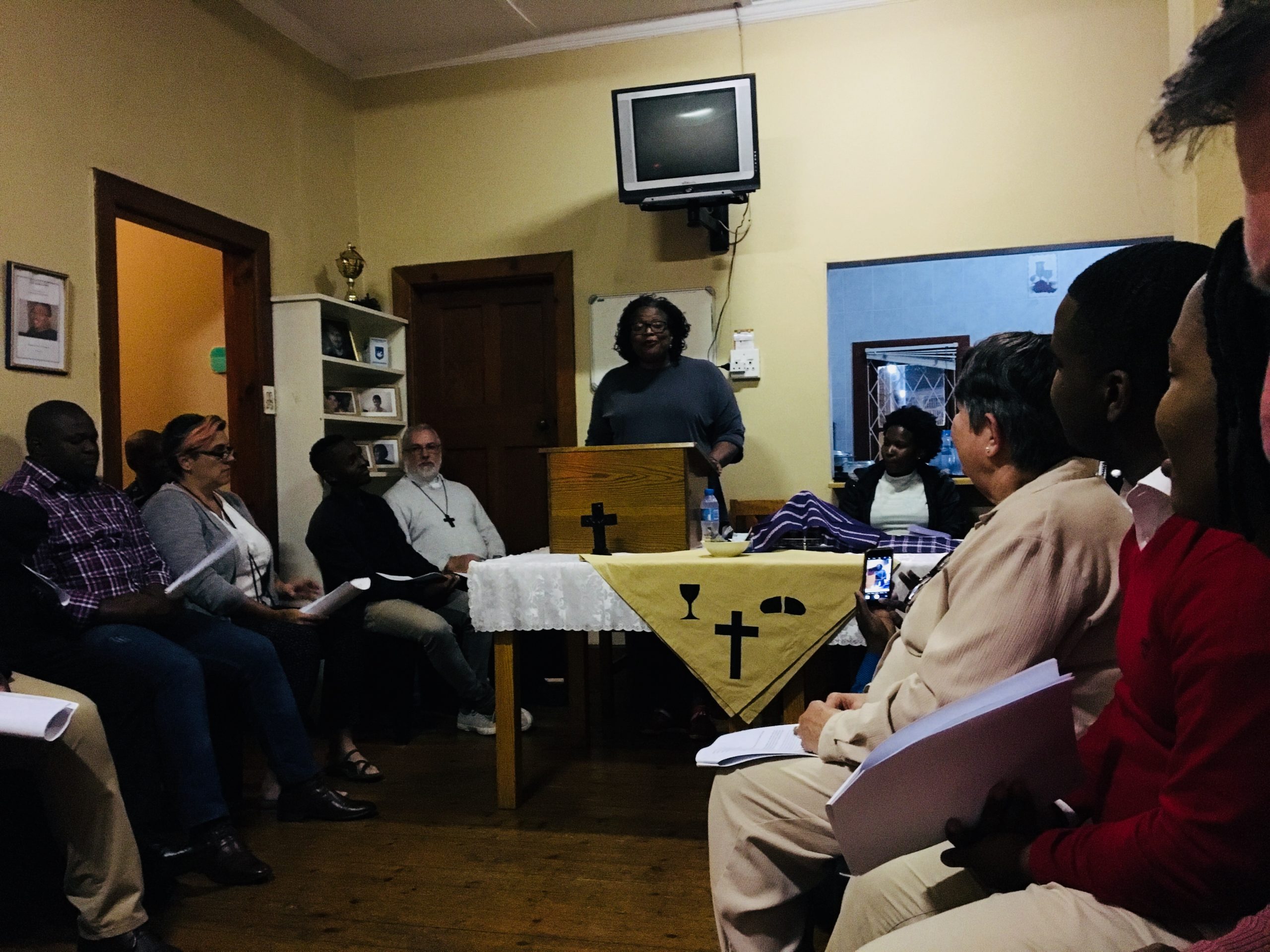 On the way to Pietermaritzburg, we stopped by the Mandela capture site. A giant, beautiful, 3-D monument of Mandela’s head (made from sticks) marks the spot. We then arrived at the House of Ministerial Formation and Training, a service and community space for UCCSA students preparing for ministry. The students were waiting for us and had planned a lovely, full worship service for which they provided major leadership. Rev. Dr. Nadine Burton preached a powerful sermon on “God Will Take Care of You,” and as chaplain of the day, I was invited to co-officiate at the communion table with the chaplain of the House. The acapella singing by the students in three native languages was beautiful. Following worship, we shared a meal of chicken and rice, along with informal conversation. Later, as the conversation became more formal, it was interesting that only male students were being invited to talk about their experiences at the House. However, women students were more than willing to share when invited by some of the Regional Ministers. We left with a renewed conviction of not being silent when we can speak up concerning issues of justice, including gender equality, and inspired by the sense of community of the House of Formation.
On the way to Pietermaritzburg, we stopped by the Mandela capture site. A giant, beautiful, 3-D monument of Mandela’s head (made from sticks) marks the spot. We then arrived at the House of Ministerial Formation and Training, a service and community space for UCCSA students preparing for ministry. The students were waiting for us and had planned a lovely, full worship service for which they provided major leadership. Rev. Dr. Nadine Burton preached a powerful sermon on “God Will Take Care of You,” and as chaplain of the day, I was invited to co-officiate at the communion table with the chaplain of the House. The acapella singing by the students in three native languages was beautiful. Following worship, we shared a meal of chicken and rice, along with informal conversation. Later, as the conversation became more formal, it was interesting that only male students were being invited to talk about their experiences at the House. However, women students were more than willing to share when invited by some of the Regional Ministers. We left with a renewed conviction of not being silent when we can speak up concerning issues of justice, including gender equality, and inspired by the sense of community of the House of Formation.
The Light of Christ in You
August 23, 2018
Nadine Burton
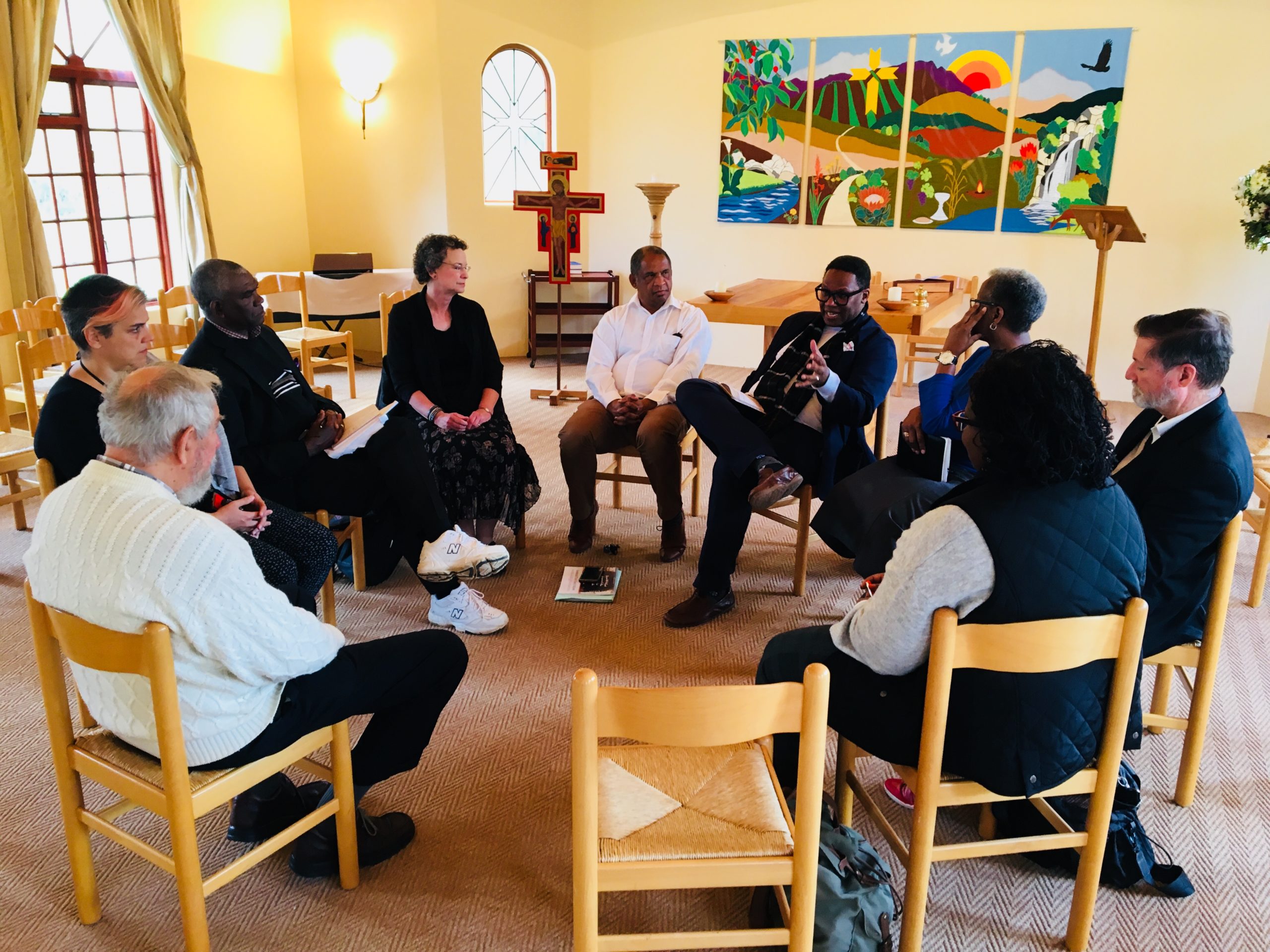 We arrived at Volmoed Retreat and Conference Center in Hermanus, South Africa right at 10:00 am. When we jumped out of the van, a gentleman hurried us to the Chapel as the service would be starting soon. Up a hilly terrain we ventured… then steps. I was out of breath upon arriving at the chapel. I sat next to an older lady who asked if I was okay. She saw that I was winded.
We arrived at Volmoed Retreat and Conference Center in Hermanus, South Africa right at 10:00 am. When we jumped out of the van, a gentleman hurried us to the Chapel as the service would be starting soon. Up a hilly terrain we ventured… then steps. I was out of breath upon arriving at the chapel. I sat next to an older lady who asked if I was okay. She saw that I was winded.
The chapel service was wonderful. Desmond Tutu attended the service, however, we were not able to engage or take pictures with him. After the service, a woman named Russie came up to me. She shared that she was named after the Russie Tree. Then she said, “I can see the light of Christ in you.” Ms. Russie is 90 years old. As I peered into her eyes, she said again, “You have the light of Christ in you.” She went on to share that we are created in the image of God. She asked me what does that mean? After a blank stare, I said, “We are a mirror of who God is.” She said, “God took part of himself – his values, attitude, motivation, purpose, expectations, relationships and placed them within Adam. And therefore, this is who we are. God is the verb and not the subject in our lives.” She also shared, (she had a lot to say in that short period), “the more we age, the easier it becomes to surrender to life.”
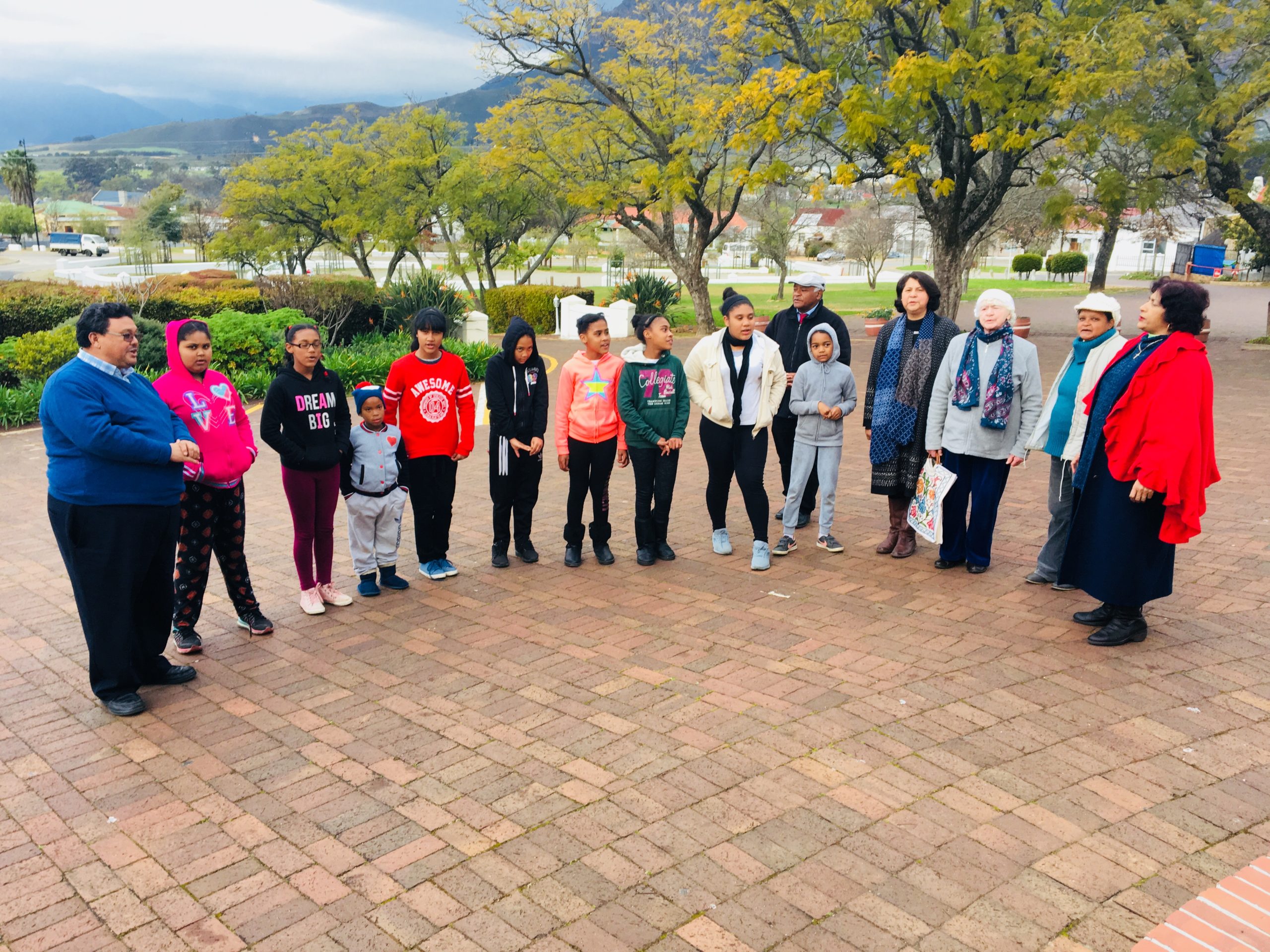 Volmoed, a beautiful Spiritual Center, focuses on spiritual growth, community and youth leadership training and development. John Deluchy, Director of the Centre, shared their intent for the Spiritual Center to be a place where one could meet God. They sponsor a nine-week training for youth to experience faith and life in community as a model for faithful Christian living. During the tour of the center grounds, we learned that one of the spaces of learning was outside. The center staff brings in facilitators who use telescopes to study the stars at night. Someone asked the question, “How do the youth transition back to normal life after nine weeks in this place of learning?” Edwin Arrison, Director of Volmoed Youth program, shared, “We prepare them. During the last week, we begin helping to prepare them to transition back to normal life.”
Volmoed, a beautiful Spiritual Center, focuses on spiritual growth, community and youth leadership training and development. John Deluchy, Director of the Centre, shared their intent for the Spiritual Center to be a place where one could meet God. They sponsor a nine-week training for youth to experience faith and life in community as a model for faithful Christian living. During the tour of the center grounds, we learned that one of the spaces of learning was outside. The center staff brings in facilitators who use telescopes to study the stars at night. Someone asked the question, “How do the youth transition back to normal life after nine weeks in this place of learning?” Edwin Arrison, Director of Volmoed Youth program, shared, “We prepare them. During the last week, we begin helping to prepare them to transition back to normal life.”
Later that evening, I reflected on the day at Volmoed. I wonder if we can really go back to our normal way of life when transformation happens – if the youth who experience that place for nine weeks of community and mentoring, can go back to a normal way of life. After experiencing the wonder of God’s creation, community, and meeting God at Volmoed, my prayer is that it would be a new normal for them – something that causes them (and us) to do better, to live better, and impact our place of service with our church and community. I also met God through the eyes of a 90-year old, faithful servant of God that day. I will take her words to heart to journey through life, and to ease into a surrender that comes with age, which is necessary to become fully who God desires for us to be.
Become Better Neighbors
Thursday, August 24, 2018
Bill Rose-Heim
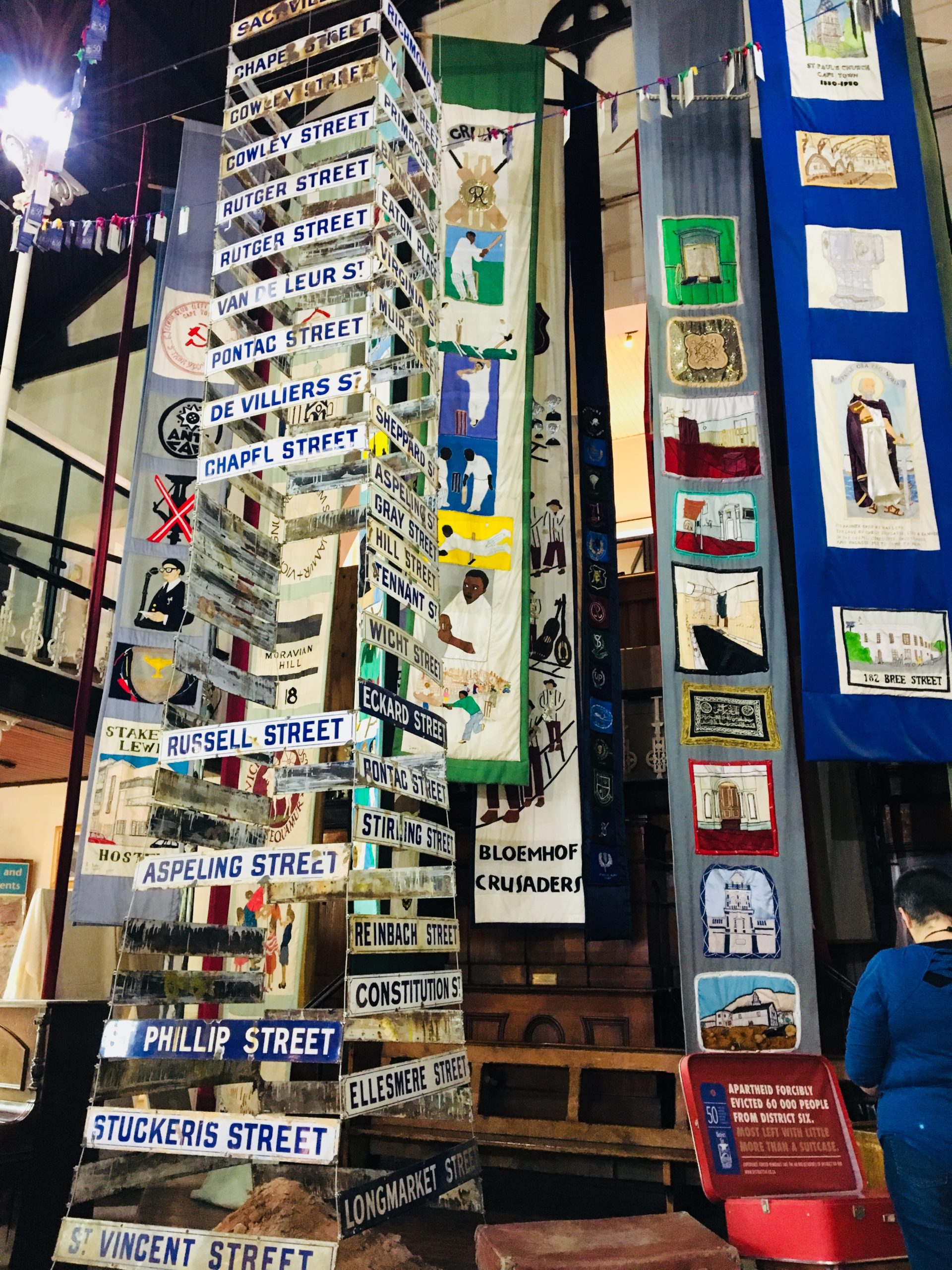 We gathered for a tour guided by Mr. Ivan La Kay, formerly a music teacher and an expert on the history and cultural evolution of Cape Town. Our opening prayer, The Privilege Is Ours to Share in the Loving, is from an African Prayer Book by Archbishop Emeritus Desmond Tutu. Given that today is a day of cultural excursions and learning, it seems appropriate to remember that we are not tourists out on a joy ride but neighbors coming to visit in the marketplaces and neighborhoods of brothers and sisters. It is not so much that we take pictures as if to boast, “I was here!” but to earnestly strive to tell stories that our neighbors want us to tell back home – stories that offer the promise of “wholeness in a fragmented world.”
We gathered for a tour guided by Mr. Ivan La Kay, formerly a music teacher and an expert on the history and cultural evolution of Cape Town. Our opening prayer, The Privilege Is Ours to Share in the Loving, is from an African Prayer Book by Archbishop Emeritus Desmond Tutu. Given that today is a day of cultural excursions and learning, it seems appropriate to remember that we are not tourists out on a joy ride but neighbors coming to visit in the marketplaces and neighborhoods of brothers and sisters. It is not so much that we take pictures as if to boast, “I was here!” but to earnestly strive to tell stories that our neighbors want us to tell back home – stories that offer the promise of “wholeness in a fragmented world.”
First stop, the military Castle of Good Hope in Cape Town, completed in 1679 by soldiers, sailors and enslaved people. Another group gathers as we did around life-like statues of Ba Pedi, Ama Hiubi, Ama Zulu, and Khoi leaders who resisted the Dutch and British occupiers.
It is considered good practice for entrepreneurs and wait staff to become familiar with those with whom they will do business. For Jesus, however, learning names, language, personal and cultural stories, was not for the prospect of profit or even persuasion but for realizing the beloved community. Realizing – not building – lest the limitations of individual pride, privilege, and power prevent true partnership as the first disciples of Christ would soon learn and later adopt as they continued in the Way. Philippians 2:5-8 comes quickly to mind.
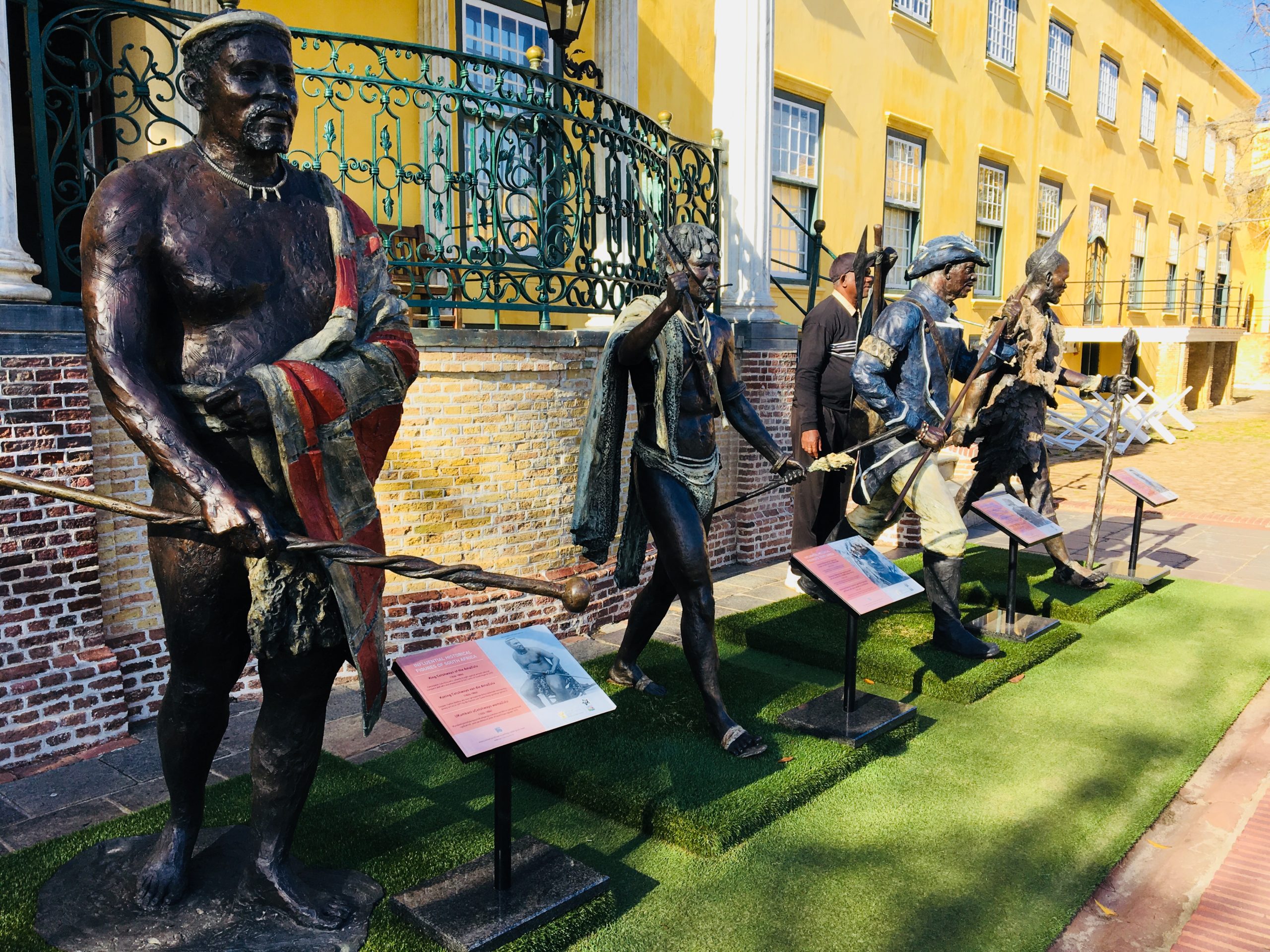 District Six is a part of the city where the agony of Apartheid is told in story after story by some of the sixty-thousand people who were forcibly removed in 1966 from their community by the descendants of Europeans who held power in the government to expand an area for the exclusive use by whites. I wonder what some of our colleagues who remember segregation are thinking and feeling as they read the stories and see the photographs. I feel sad, but such sadness is soft among those of us who live with unearned, stolen privilege. It is no more than a hot breeze compared to the teary thunderstorms of pain and anger felt by many who still live with the scars and fresh wounds from mistreatment, marginalization and forced segregation. “I want to forgive and move on, but how can I trust (people who perpetuate and profit from systemic racism)?” This is a live question for at least one neighbor. Remembering well, as a poster in the District Six Museum reminds us, invites a commitment to “rebuild a city which belongs to all of us, in which all of us can live, not as races but as people.”
District Six is a part of the city where the agony of Apartheid is told in story after story by some of the sixty-thousand people who were forcibly removed in 1966 from their community by the descendants of Europeans who held power in the government to expand an area for the exclusive use by whites. I wonder what some of our colleagues who remember segregation are thinking and feeling as they read the stories and see the photographs. I feel sad, but such sadness is soft among those of us who live with unearned, stolen privilege. It is no more than a hot breeze compared to the teary thunderstorms of pain and anger felt by many who still live with the scars and fresh wounds from mistreatment, marginalization and forced segregation. “I want to forgive and move on, but how can I trust (people who perpetuate and profit from systemic racism)?” This is a live question for at least one neighbor. Remembering well, as a poster in the District Six Museum reminds us, invites a commitment to “rebuild a city which belongs to all of us, in which all of us can live, not as races but as people.”
Our guide took us through several sections of Cape Town and on a drive along the coast. The scenery is breathtaking. On Table Mountain, we decided not to linger in a long line for tickets to ride the cable car to the top. Pilgrimages teach us to continually reprioritize where we invest our time and energy. Cell phones, cameras, and video recorders quickly fill up with scenes we want to share as drive along the coastal highway. The contrast between the neighborhoods of European descendants and those progenies of the first Africans is clear but conditions are improving where people of faith practice productive partnership. Through Global Ministries we participate in partnership led by local people who are strong, loving, wise, and called! We are not helping to “fix” anything, but to become better neighbors, collaborating around the Great Commandment.
Walk Tall
August 25, 2018
Dale Braxton
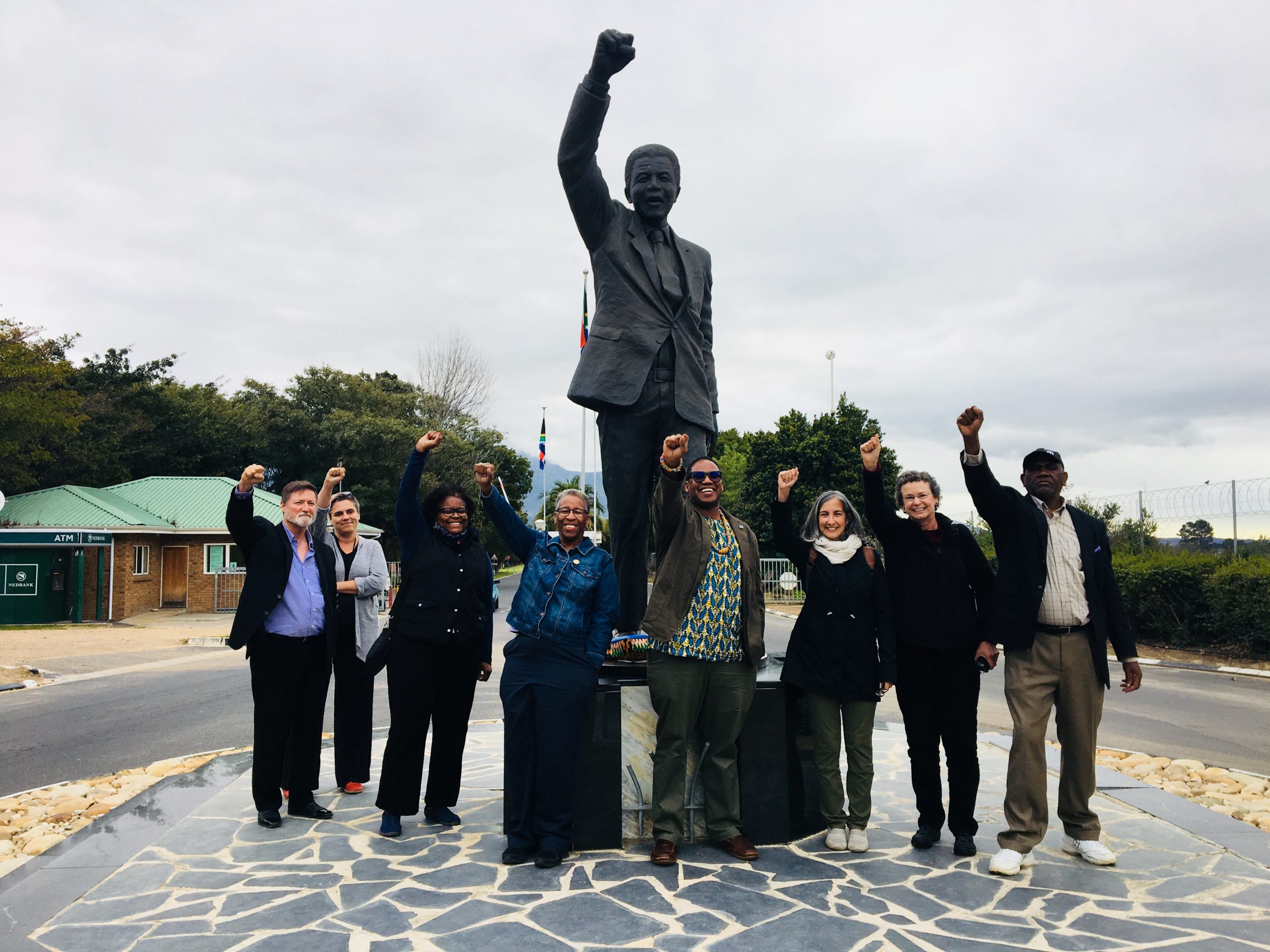 The day started with this South African blessing:
The day started with this South African blessing:
“Walk tall, walk well, walk safe, walk free and may harm never come to thee.
Walk wise, walk good, walk proud, walk true and may the sun always smile on you.
Walk prayer, walk hope, walk faith, walk light and may peace always guide you right.
Walk joy, walk brave, walk love, walk strong and may life always give you a song.”
We are ready to continue our journey to Robben Island where the honorable Nelson Mandela was in prison. It is rainy, windy, and cold so we could not make the trip, as these are dangerous conditions. Someone standing in line behind me from Cape Town said “the table is covered because of the clouds,” and it is better to be safe. Due to the cancelation, some from our delegation did last minute shopping, packing, and resting before flying to Dubai and onto New York.
As I reflect on this journey, I was very impressed by some of Nelson Mandela quotes. Just a few for you:
“I learned that courage was not the absence of fear, but the triumph over it…. The brave man is not he who does not feel afraid, but he who conquers that fear.”
“There are few misfortunes in the world that you cannot turn into a personal triumph if you have the iron will and the necessary skill.”
“I hope that life might offer me the opportunity to serve my own people and make my own humble contribution to their freedom struggle.”
“For to be free is not merely to cast off one’s chains, but to live in a way that respects and enhances the freedom of others.”
“We accord a person’s dignity by assuming that they are good, that they share human qualities we ascribe to ourselves.”
“I have no doubt that posterity will pronounce that I was innocent.” Nelson Mandela
Final Thoughts
LaTaunya Bynum
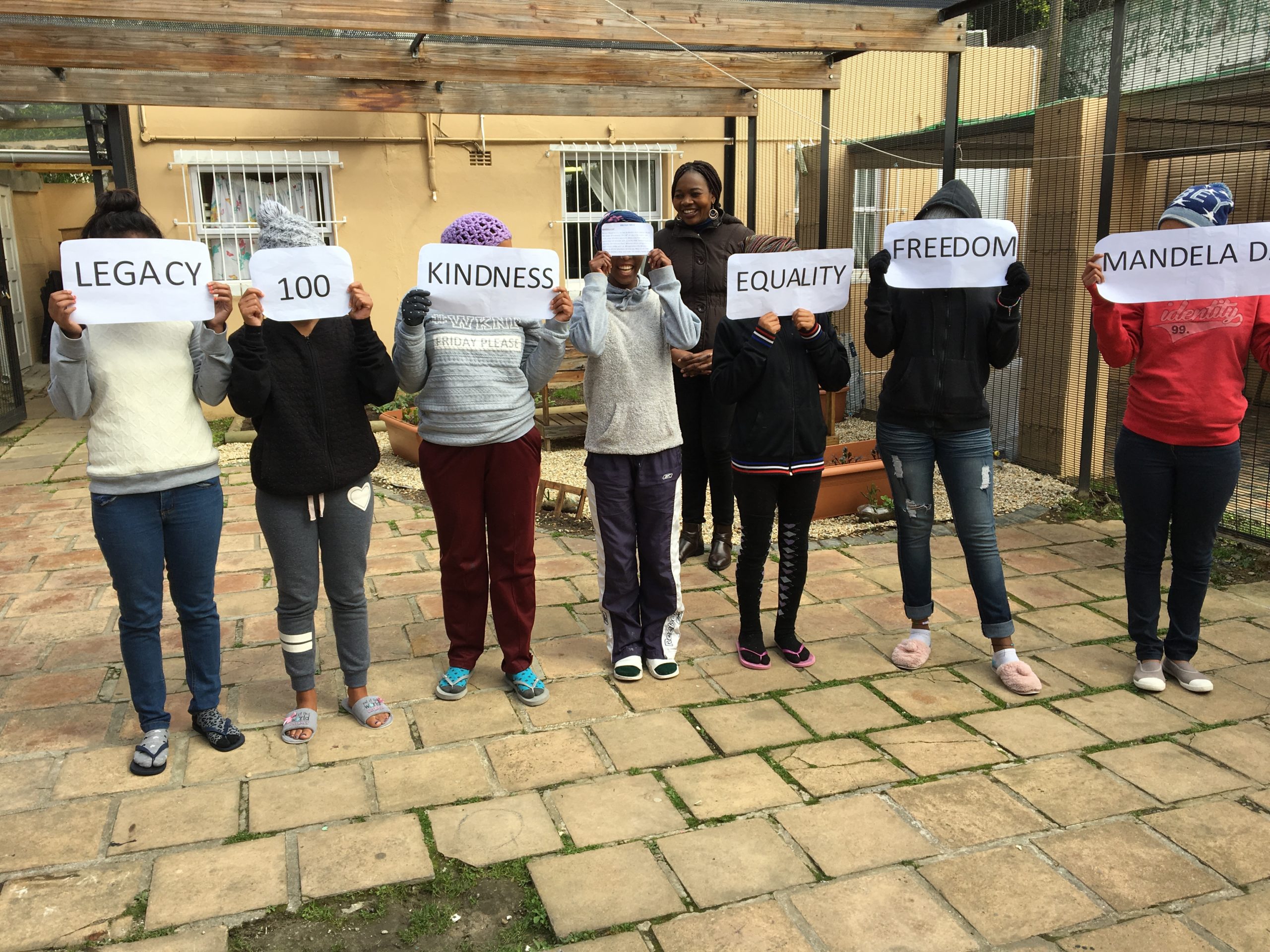 Our trip began in Ghana with a visit to the memorial for Kwame Nkurmah, the first President of an independent Ghana – the first of the Black African countries to be so. We concluded our trip in South Africa, where we had been scheduled to visit Robben Island where Nelson Mandela was held for 18 of the 27 years he was imprisoned by the government of South Africa. Rain and wind prevented that trip, but the legacy of Mr. Mandela is found throughout South Africa from monuments to his image on the nation’s currency. We were able to visit the place where he was captured, and the place from which he walked from imprisonment to freedom.
Our trip began in Ghana with a visit to the memorial for Kwame Nkurmah, the first President of an independent Ghana – the first of the Black African countries to be so. We concluded our trip in South Africa, where we had been scheduled to visit Robben Island where Nelson Mandela was held for 18 of the 27 years he was imprisoned by the government of South Africa. Rain and wind prevented that trip, but the legacy of Mr. Mandela is found throughout South Africa from monuments to his image on the nation’s currency. We were able to visit the place where he was captured, and the place from which he walked from imprisonment to freedom.
Ghana is a country that is lush and strong, filled with vibrant people whose faithfulness and hopefulness was inspirational. In Ghana, there was a warm, hospitable, entrepreneurial spirit among the people in the capital city of Accra, and elsewhere. The citizens of Ghana know that the economic well-being of their families and of their country depends on them.
Our global partners in Ghana, the Evangelical Presbyterian Church, Ghana and the Christian Council of Ghana are nurturing young people, training marriage and family counselors, and helping women to learn income-producing skills that will enable them to care for and educate their children. This eliminates the need to send their children away, too often and unwittingly into the hands of human traffickers, who will use the children for labor and sexual exploitation. If their mothers and fathers can provide for them, there will be no need to send them away.
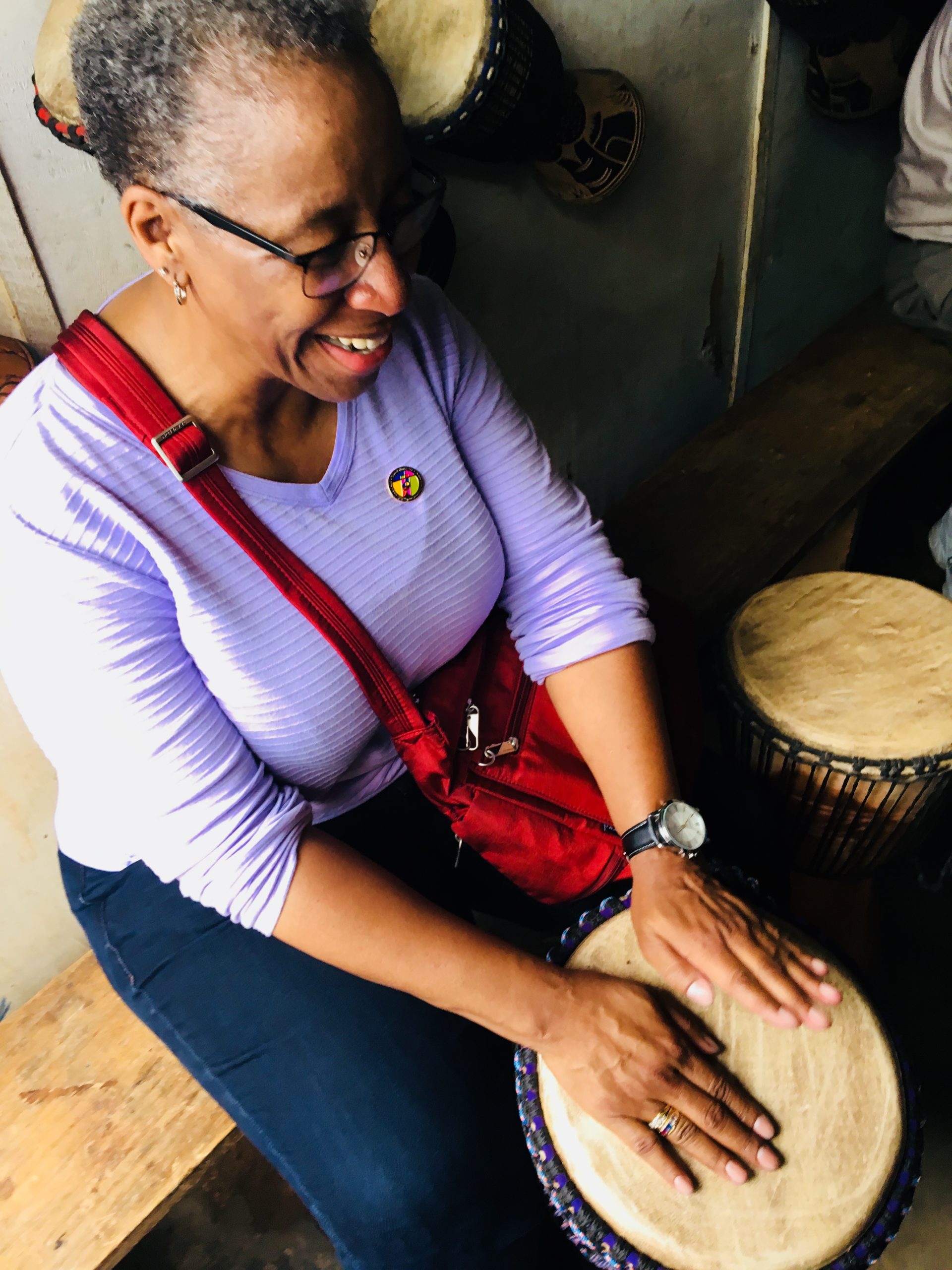 One of the most significant parts of our time in Ghana were the visits to the Christiansburg and Elmina slave castles. Active military forts and trading posts, these castles were points of departure for enslaved persons. Ghana is reckoning with their history as a beginning point of the Trans-Atlantic slave trade and the diaspora that resulted from it. I felt like I had completed a circle by seeing where the slave trade began in Ghana, and where enslaved people were bought and sold in Alabama, among other U.S. states.
One of the most significant parts of our time in Ghana were the visits to the Christiansburg and Elmina slave castles. Active military forts and trading posts, these castles were points of departure for enslaved persons. Ghana is reckoning with their history as a beginning point of the Trans-Atlantic slave trade and the diaspora that resulted from it. I felt like I had completed a circle by seeing where the slave trade began in Ghana, and where enslaved people were bought and sold in Alabama, among other U.S. states.
In South Africa, twenty-four years after the end of Apartheid – racial separation as government policy – I could not help but see the parallels between that awful period in South Africa and the United States prior to the Civil Rights legislation in the 1950’s and 1960’s. As one church leader shared with us in Durban, “Apartheid really messed us up.” Legal racial segregation and its aftermath have messed us up in the United States, too. But there is a part of the church of Jesus Christ working to overcome the legacy of legal segregation and the reality of ongoing racism.
I am grateful for the church visible in the Christian Council of Ghana, the Evangelical Presbyterian Church, Ghana, the United Church of Christ, South Africa, and the Christian Church (Disciples of Christ), in the United States and Canada. I am grateful for their witness to the wholeness of the church, and the humanity and dignity of God’s people throughout the world.

